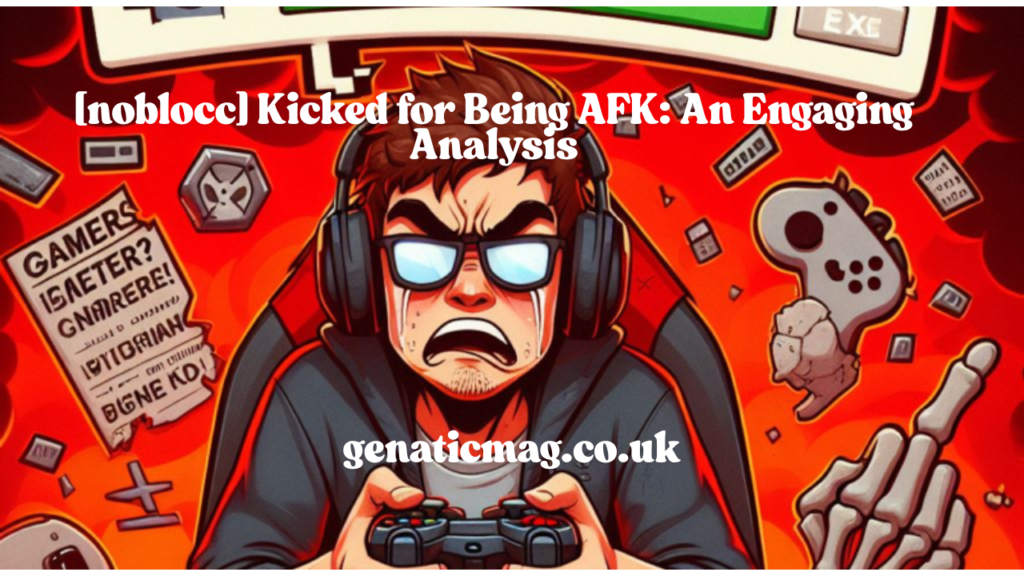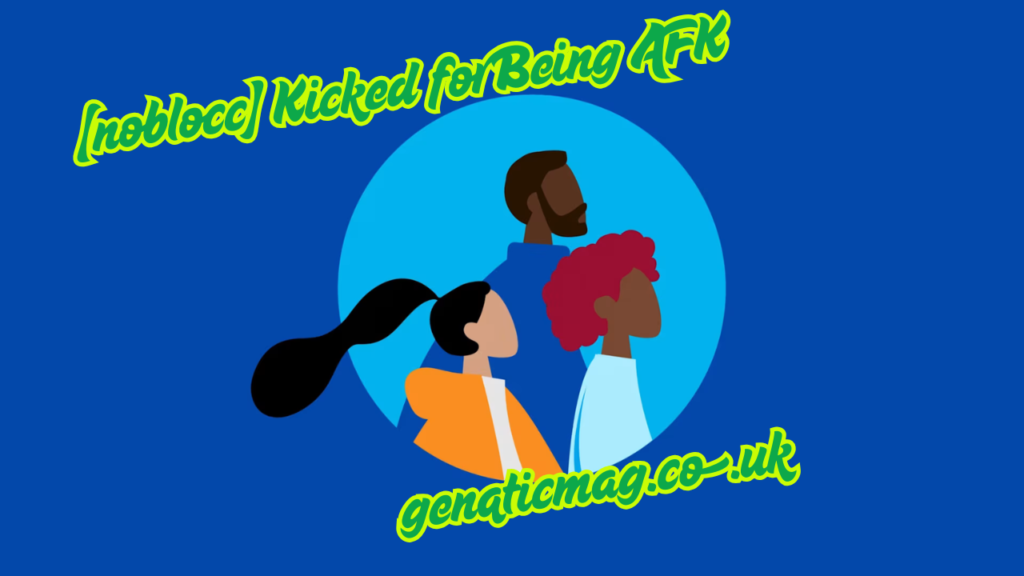In the ever-evolving world of online multiplayer gaming, moments of conflict, confusion, and even comedy frequently arise. One such scenario that has recently sparked debate and curiosity across forums and game lobbies alike is “[noblocc] Kicked for Being AFK: An Engaging Analysis, ??”. This peculiar phrase—equal parts cryptic and captivating—has become the focal point for discussions not just about one individual’s experience, but about the broader gaming ecosystem, expectations of player behavior, and the social dynamics that define online communities.
This deep-dive article explores the nuances of “[noblocc] Kicked for Being AFK: An Engaging Analysis, ??,” unpacks the implications of being “AFK” (away from keyboard), and questions whether such actions are fair, necessary, or reflective of deeper issues within gaming culture.
The Meaning Behind “[noblocc] Kicked for Being AFK”

Before we can understand the full weight of this scenario, we must decode it. “[noblocc]” seems to refer to a player, guild, or user alias in an online multiplayer game. The phrase “kicked for being AFK” is a reference to being forcibly removed from a game session or server due to inactivity.
The “AFK kick” is a common mechanic in many games to maintain active participation and fairness. However, when paired with a name like [noblocc], the phrase takes on a narrative weight—this is not just a system auto-kick, but a social or community decision. The addition of “??” adds intrigue, questioning motives, fairness, or confusion surrounding the event.
Understanding the AFK Phenomenon in Multiplayer Games

In multiplayer games—especially competitive or team-based environments—AFK players are considered detrimental to team success. Whether intentional or unintentional, when someone goes AFK, they:
- Weaken their team’s effectiveness
- Disrupt team coordination and synergy
- Frustrate other players who rely on teamwork
- Can cause loss of ranking or rewards in ranked games
In such a climate, players going AFK are frequently removed to ensure balance and engagement. However, the line between strategic patience and disruptive absence is not always clear. Did [noblocc] take a bathroom break, suffer an internet lag, or genuinely step away for too long? These unanswered questions fuel the intrigue of this analysis.
Social Dynamics: Was [noblocc] Unfairly Targeted?
Here’s where things get particularly engaging. In many games, players vote to kick others, often based on perceived behavior, performance, or sometimes personal bias. While the AFK label provides justification, it can also mask deeper dynamics at play:
- Revenge Voting: Was [noblocc] kicked due to an argument or disagreement earlier in the match?
- Prejudice or Bias: Could the kick have stemmed from social dynamics—clans targeting outsiders, veteran players disliking newbies?
- Mistaken Identity: Was [noblocc] even AFK? Or was the inactivity misunderstood?
These scenarios lead us to consider how online interactions and impulsive judgments can create a hostile environment, especially for players who may be newer, quieter, or play differently from the meta.
The Role of Game Design: Enabling or Preventing Abuse

Most modern online games have built-in AFK detection systems. These might include:
- Idle timers
- Movement checks
- Automatic penalties or cooldowns
- Warnings before kicks
However, when the system allows players to vote out a teammate, human subjectivity enters the mix. This raises questions:
- Should players have that power?
- Can it be abused?
- Is there an appeals system?
In “[noblocc] Kicked for Being AFK: An Engaging Analysis, ??,” the story could be an example of a system where tools meant for fairness are manipulated for other purposes. Game designers must constantly balance freedom with safeguards.
The Human Element: Life Happens
Let’s shift our perspective. Maybe [noblocc] wasn’t trying to troll or sabotage. Maybe a doorbell rang. Maybe their dog knocked over a glass of water. Maybe there was a real-world emergency.
The reality is that online games are played by human beings, and real life doesn’t always pause for a raid boss or ranked match. In such cases, being AFK isn’t malicious—it’s life getting in the way. The harshness of being immediately booted from a game by peers or systems shows how little room there is for compassion in competitive spaces.
The Community’s Reaction: Memes, Mystery, and Moral Debates
Since the phrase “[noblocc] Kicked for Being AFK: An Engaging Analysis, ??” emerged, community forums have spun it into memes, dramatic reenactments, and moral debates. Some view it as a case study in toxic gaming culture. Others find humor in the ambiguity and absurdity of the phrasing itself.
The double question marks evoke confusion—was the kick justified? Was [noblocc] really AFK? Or is this an internet in-joke we’re all now participants in? This mystery has sparked waves of creativity, with players creating mock trials, short skits, and commentary videos trying to unpack the whole situation.
What It Says About Us: Gamers, Judgment, and Justice
At its core, “[noblocc] Kicked for Being AFK: An Engaging Analysis, ??” is not just a tale of one player getting kicked. It’s a reflection of:
- How fast we judge others online
- The limits of fairness in competitive environments
- The fragility of digital social contracts
- Our tendency to memeify what we don’t fully understand
In some ways, [noblocc] has become a symbol—of misunderstood players, of fleeting moments that spiral into legend, and of the tension between efficiency and empathy in digital spaces.
Conclusion: More Than Just an AFK Kick
So, what can we learn from “[noblocc] Kicked for Being AFK: An Engaging Analysis, ??”? That something as simple as going AFK can spiral into something much bigger. It’s a cautionary tale about how we treat each other in online spaces, how quick decisions can have ripple effects, and how even being kicked from a game can leave a legacy—if the context, players, and timing align just right.
Whether [noblocc] was wronged, careless, or simply caught up in a misunderstanding, their story invites us to reflect on our own behavior. Next time you see someone AFK, will you vote to kick—or wait just a little longer to understand what’s really going on?
Also Read : Exploring 1v1.lol Unblocked 66: The Ultimate Gaming Experience
![[noblocc] Kicked for Being AFK: An Engaging Analysis [noblocc] Kicked for Being AFK](https://gentickmag.co.uk/wp-content/uploads/2024/10/why-you-get-noblocc-kicked-for-being-afk-1-768x432.webp)